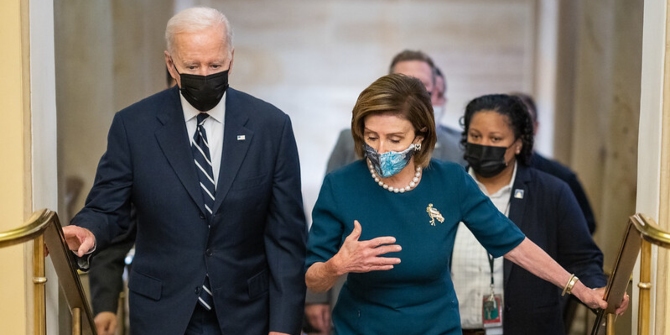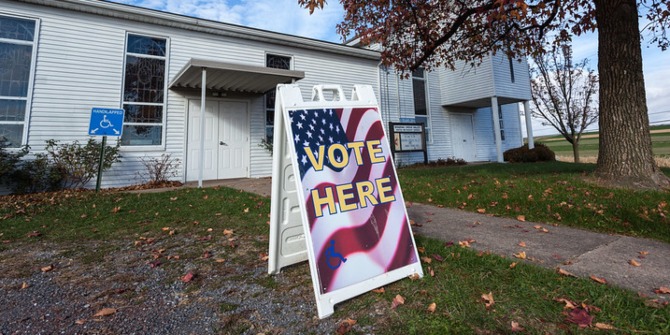
 Following the 2022 midterms, there are positive narratives for Republican and Democrats alike, and, almost two years after the end of his presidency, US politics may have moved beyond peak Trump. For Peter Finn and Robert Ledger, there are interesting details related to the House of Representatives, Senate, and state level politics. Yet, the overall picture likely shows deadlock to come at the federal level, while successful state level politicians for both parties look to burnish their credentials, with some eying runs for the presidency in 2024.
Following the 2022 midterms, there are positive narratives for Republican and Democrats alike, and, almost two years after the end of his presidency, US politics may have moved beyond peak Trump. For Peter Finn and Robert Ledger, there are interesting details related to the House of Representatives, Senate, and state level politics. Yet, the overall picture likely shows deadlock to come at the federal level, while successful state level politicians for both parties look to burnish their credentials, with some eying runs for the presidency in 2024.
- Our mini-series, ‘The 2022 midterms‘, explores aspects of the midterm elections at the presidential, Senate, House of Representative and state levels, and also reflects on what the results will mean for US politics moving forward. If you are interested in contributing, please contact Rob Ledger (ledger@em.uni-frankfurt.de) or Peter Finn (p.finn@kingston.ac.uk).
In a post prior to the 2022 midterm elections we mapped out three main federal level scenarios that could occur; the Democratic Party could hold the House of Representatives and Senate and enter the marathon race for the presidency in 2024 reinvigorated; a split Congress, with the Republicans likely to take the House and Democrats hold the Senate; and a Republican sweep of both houses of Congress. This piece built on a series of posts exploring the broader context of US elections, whether within the context of a particular cycle or set of local, state, or federal elections occurring on any particular day or election cycle, or with relation to the significant impact of history on US elections.
Now that the dust has settled, US voters have delivered the second scenario. Though Democrats are broadly seen as having outperformed expectations (or is it that Republicans underperformed?), and while obviously not as beneficial to them as holding both houses, they certainly avoided the Red Wave predictions that came to dominate coverage in the final days of the election campaign. As always, there are interesting details at the state level, with Florida and Michigan showing the need to look beyond Washington DC.
How it Played Out for The House
The House of Representatives has switched from Democratic to Republican control, with the most likely (though not guaranteed) outcome at present being California Republican Kevin McCarthy taking over the role of House Speaker from (also California) Democrat Nancy Pelosi, who, in her second stint in the role, has held the position since the Democrats took the House in 2018.
Republicans underperformed expectations, whether judged against previous midterms, their own priors, general polling averages, or media hype. Despite this, Republicans have, just about, taken control of the House of Representatives. The biggest challenge, one suspects, for McCarthy will be keeping the disparate factions of his volatile party together. A wafer-thin majority gives individual lawmakers far more clout than they would usually expect. In the past two years in the other chamber, West Virginia Senator Joe Manchin, a Democrat, has aptly demonstrated how one politician can hold a huge sway over a party without a significant majority.
In the longer term, perhaps the most significant event following the 2022 midterms may be the decision of Pelosi, whose husband was seriously injured in an attack at their home just prior to the midterms, to step down as leader of the Democratic Caucus.
Hakeem Jeffries, who represents New York’s 8th District, will replace Pelosi. As with McCarthy, a key focus for Jeffries will be holding together a caucus split across a spectrum from centrists to progressives. Given the margins involved in the next Congressional session, one presumes the party most able to maintain discipline will make the best of the hand it has been dealt.
Senate Results
The Democrats retained control of the Senate, despite a number of close races and gloomy polls ahead of election day. By winning Pennsylvania from the Republicans and holding on in tight races in Arizona and Nevada, Democrats will at the very least keep 50 seats in the chamber, and therefore keep control of Vice President Kamala Harris’s tie-breaking vote, whatever the outcome of a December run-off in Georgia.
As Lauren C. Bell outlined in a piece for the series, Democrats defied low expectations in Senate races due to the importance of abortion as an issue following the overturning of Roe vs Wade by the Supreme Court, high turn-out among younger voters and the poor quality of several Republican candidates. Indeed, the midterms appeared to show voters’ preference for moderate, rather than extreme, candidates in many states. Trump-backed candidates often purporting to believe the 2020 election result was fraudulent and other views ranging from the bizarre to the dangerous, underperformed the Republican Party as a whole by around five percentage points, according to the New York Times.
State-Level Focus
On the Republican side, the undoubted success story occurred in Florida, where incumbent Governor Ron DeSantis easily won re-election. Having squeaked past Andrew Gillum by 0.4 percent of the vote in 2018, DeSantis beat Democrat former Governor, Charlie Crist by 19 points this time round. DeSantis has shown a potential route for Republicans more broadly, combining populism, such as flying migrants from Texas to Martha’s Vineyard in one publicity stunt, with social conservatism and generally positioning himself as an anti-woke culture warrior.
The Senate midterms proved a major disappointment for Democrats in Florida with incumbent Republican Senator Marco Rubio also winning easily. In fact, Florida has shifted from the wafer-thin swing state embodied by the 2000 Bush-Gore presidential election controversy, to seemingly solid Republican territory.

Photo by Ernie Journeys on Unsplash
In the Upper Midwest state of Michigan, meanwhile, another incumbent Governor, Gretchen Whitmer, delivered a key victory for Democrats in the swing state. Following a race against Trump supporter and denier of the 2020 presidential election result, Tudor Dixon, Whitmer pitched her victory as a rejection of political violence in the wake of the attack on Pelosi’s husband, as well as a 2020 plot to kidnap Whitmer herself. Whilst also noting the importance of abortion and economic issues. Looking forward, should she seek it, and presuming she and the Michigan Democratic Party are able to make a success of holding the trifecta in the state for the first time since the 1980s (and such presumptions should, of course, always come with an acknowledgment success is certainly not guaranteed), it seems a national role for Whitmer would be a possibility.
2024 Primaries: A game of stick or twist for both parties
Attention will inevitably turn to the 2024 presidential campaign relatively quickly, even with the dust yet to fully settle over the midterms. Nevertheless, these recent elections have clearly diminished Donald Trump, whose endorsements proved a millstone for Republican candidates, and boosted Florida Governor Ron DeSantis, who won re-election by some distance. Unsurprisingly, electoral humiliation has not prevented Trump from declaring his candidacy for the 2024 presidency. Commentators have speculated that DeSantis could challenge Trump for the Republican nomination, possibly declaring his candidacy after the next state legislative session ends in April. Other candidates, albeit with less chance of dislodging Trump according to opinion polls, include former Vice President Mike Pence and former Secretary of State Mike Pompeo, as well as the somewhat more suitable Virginia Governor Glenn Youngkin.
For Democrats, much hinges on whether President Joe Biden decides to run in 2024, or steps aside in favour of another set of challengers. If Biden wishes to stitch together a positive narrative in favour of renomination, it is certainly there. He beat Trump in 2020, obtained legislative victories despite a relatively small House majority and, just about, held control of the Senate. Moreover, as discussed above, Democrats are broadly seen as having overperformed in the midterms against expectations. On the other hand, if Trump does manage to gain the Republican nomination again, Biden could continue his pitch as a steady hand at the tiller. At present, it appears that Biden will run again, though a ‘final decision’ appears likely ‘early next year’.
Interestingly, California Governor Gavin Newsom, who seemed to be positioning himself for a run in 2024 for the Democratic nomination for president recently ruled himself out of contention, declaring his support for Biden. If Newsom is the harbinger of the party starting to unite behind another Biden run, this could, perhaps, give the Democrats an advantage as they are able to target resources behind a singular campaign while the Republican Party goes through what one presumes will be a bruising primary process.
- Please read our comments policy before commenting.
- Note: This article gives the views of the author, and not the position of USAPP – American Politics and Policy, nor the London School of Economics.
- Shortened URL for this post: https://bit.ly/3un7dyS






